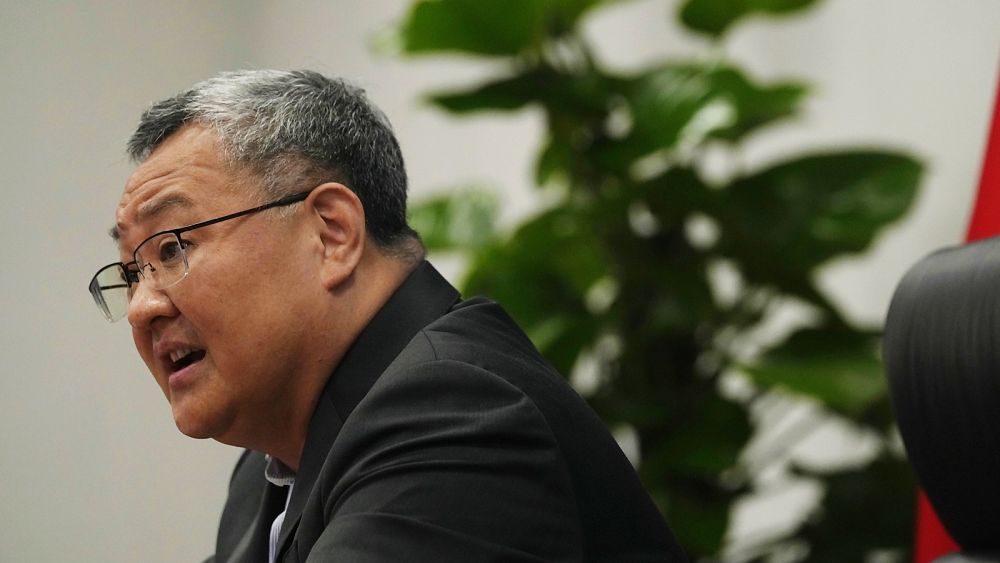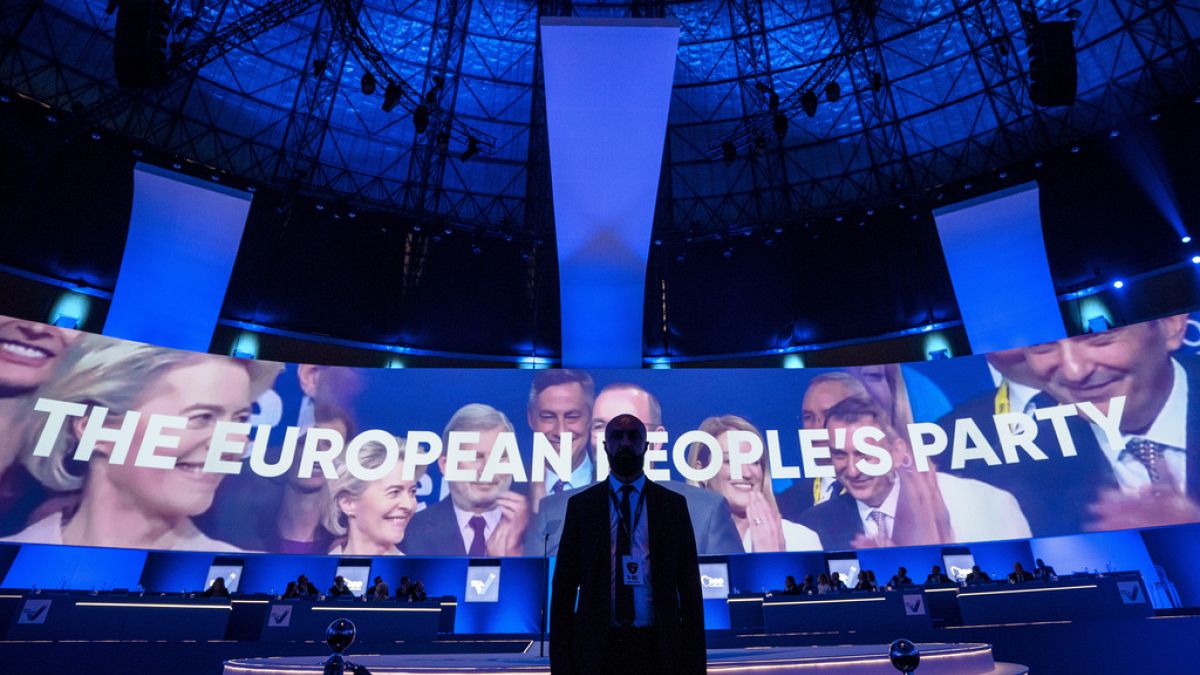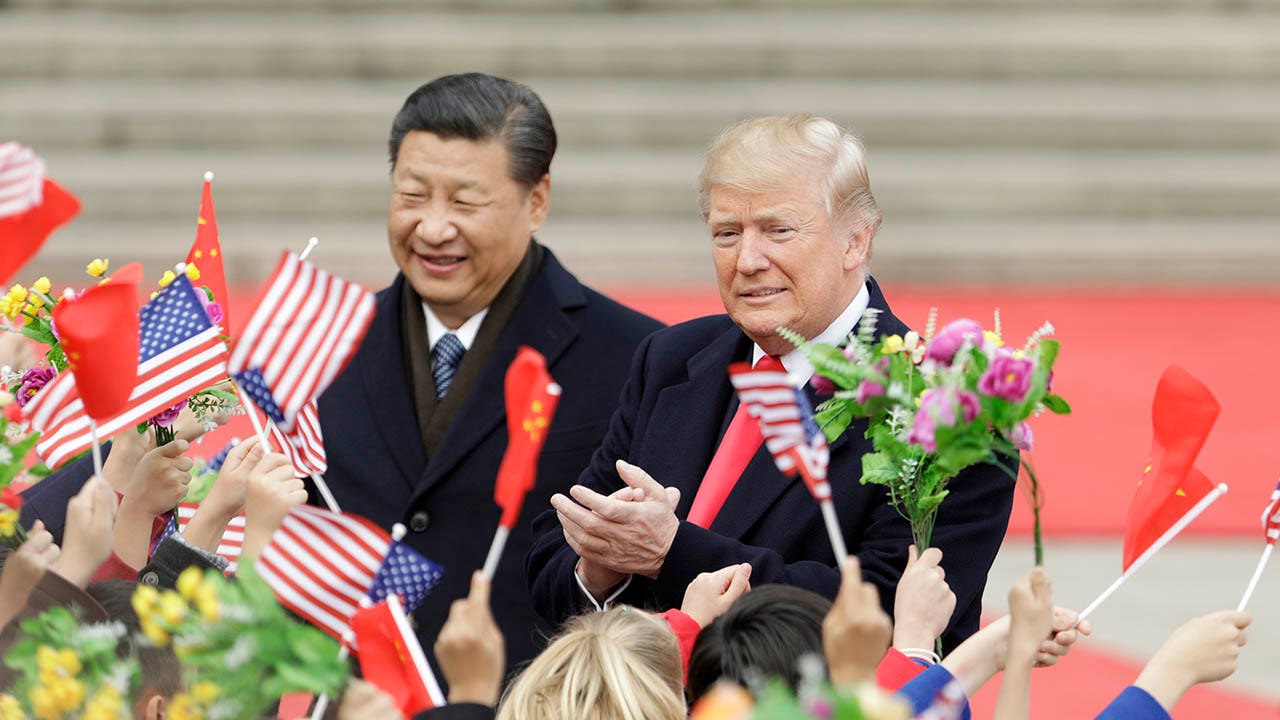World
Chinese ambassador blasts EU ‘assertiveness’ and ‘unilateral actions’

Fu Cong, China’s ambassador to the European Union, delivered on Tuesday a speech denouncing the bloc for its “assertiveness,” “unilateral actions” and “politically motivated” strategy of de-risking.
His comments refer to the growing shift in thinking in Brussels, where relations with China are now being closely examined through a lens of economic and national security, prompting policy initiatives to mitigate harmful dependencies, control the transfer of sensitive technologies and keep foreign subsidies in check.
“The scope and the speed of the changes in the EU is (sic) unprecedented as many of these measures are protectionist in nature and potentially in conflict with WTO rules,” Fu said during an event organised by the China Europe International Business School (CEIBS) and attended by Euronews.
“We are deeply concerned about the EU’s growing assertiveness and the unilateral actions as they cause disruptions to all bilateral trade and investment.”
The Chinese ambassador used his keynote speech, whose main theme was the rebuilding of mutual trust, to air an extensive list of grievances that began with the bloc’s three-pronged designation of China as a partner for cooperation, an economic competitor and a systemic rival, which Beijing has repeatedly contested since its formal introduction in 2019.
“Understanding this so-called ‘Holy Trinity’ is a mind-boggling exercise,” Fu said. “This concept is not only contradictory in itself but also inconsistent with the facts. Partner? Of course, always. Competitors? Maybe. But since when have we become rivals?”
The ambassador noted that China’s political system – an authoritarian regime under the dominant rule of the Chinese Communist Party – was not a “problem” when diplomatic relations were established in the 1970s and should therefore not be one today.
“Some would argue that China does not share EU values. If this logic goes, then the EU will have a lot of rivals because from the Middle East to Africa, from Asia to Latin America, there are many countries who obviously do not see eye to eye with Europe when it comes to values,” Fu said, using the Israel-Hamas war as an example of divergent responses on the global stage.
“This perception, unfortunately, often leads to erosion of trust. Sometimes frictions or even confrontations,” he went on. “We have already seen a worrying trend of emphasising by some groups on the rivalry part while downplaying the partner part.”
Fu then pointed the finger directly at the European Commission for promoting the strategy of de-risking and reinforcing its arsenal of trade measures to lessen the bloc’s overreliance on some Chinese imports, including raw materials, solar panels and batteries. The rethinking has also led to an anti-subsidy investigation into China-made electric cars, with reports that a similar probe could be launched into wind turbines.
“A politically motivated de-risking process runs counter to established business norms, and many would argue is a risky exercise in itself,” Fu told the audience in Brussels.
“This may well spill over and affect wider areas in the future. That would be the least welcoming news to an already struggling (global) economy.”
Europe’s response
Fu’s speech was followed by a virtual intervention of Jorge Toledo, the EU’s Ambassador to China, which served as an official retort to the complaints made by the Chinese envoy.
De-risking is “not protectionist. It is not closing the door to cooperation. Our de-risking is country-agnostic and only affects a small part of our trade,” Toledo said. “De-risking is not self-reliance, one of China’s major economic strategies for decades.”
As Fu did, Toledo used his allotted time to spell out the many disagreements and controversies that are currently upsetting EU-China relations, such as a ballooning trade deficit and the persistent barriers and obstacles that European companies face in the Chinese market, including a recent update to the anti-espionage law that grants Beijing greater powers to crack down on perceived threats to national security.
“Rebuilding trust will take time,” he warned.
Notably, Toledo raised a topic that Fu completely evaded: Russia’s aggression on Ukraine. Since February 2022, Brussels has urged Beijing to condemn the invasion and uphold the principles of the UN Charter. But President Xi Jinping has ignored the calls and instead maintained contact with Vladimir Putin on a business-as-usual basis.
“Territorial integrity has always been a key principle for China in international diplomacy. Its own territorial integrity is the reddest of the lines,” Toledo said. “Russia’s war of aggression against Ukraine is a blatant breach of this principle. It is very difficult for us to understand China’s double-standards stance.”
“I cannot emphasise enough how damaging for China’s image and reputation in Europe is the position chosen in Beijing on the Russian war in Ukraine,” he added.
The disparate perspectives projected by both envoys expose the chasm between Brussels and Beijing, which has deepened in recent years over the COVID-19 pandemic, the repression of Uyghurs in Xinjiang, tit-for-tat sanctions, tensions in the Taiwan Strait and trade restrictions in the fields of semiconductors and raw materials.
The two sides are now attempting to curb this deterioration and achieve something akin to a diplomatic reset. The last couple of months have seen several European Commissioners, including Valdis Dombrovskis, Věra Jourová and Thierry Breton, as well as High Representative Josep Borrell, visit Beijing to lay the groundwork for an EU-China summit in early December.
“I know that Chinese interlocutors and friends don’t like that we describe part of our relationship as a systemic rivalry. But as I say, it is a description and a fair one. We are indeed rivals. Our values and beliefs are different on many subjects, including democracy and the universal character of human rights,” Toledo said.
“The way in which we as Europeans view our relationship with China will probably not change any time soon, I’m afraid.”

World
What to expect as Israel-Hamas cease-fire goes into effect on Sunday

After the cease-fire agreement between Israel and Hamas goes into effect Sunday morning at 8:30 a.m. local time in Israel, which is 1:30 a.m. ET, three female hostages are the first expected to be released.
As of Saturday, at 8 p.m. ET, Israel was still waiting on the list of which hostages would be released first.
Israel’s Cabinet approved the deal early Saturday morning for a cease-fire in Gaza and the release of Israeli hostages captured after Hamas’ unprovoked attack on Israel on Oct. 7, 2023.
Phase One of the deal starts on Sunday with the release of the first three hostages and lasts 42 days.
ISRAEL DEFENSE FORCES WILL RECEIVE HOSTAGES SUNDAY WITH EQUIPPED CAMPER TRAILERS AND COMFORTING SUPPLIES
After the cease-fire agreement between Israel and Hamas goes into effect Sunday morning at 8:30 a.m. local time, which is 1:30 a.m. ET, three female hostages are the first expected to be released. (Maya Alleruzzo/Pool/AFP via Getty Images)
During that time, a total of 33 hostages will be released, with children, women, female soldiers, people over 50, and sick or injured men being prioritized. More than 1,000 Palestinian prisoners will be sent back to Gaza as well.
Most of the Israeli hostages are believed to still be alive, but their identities won’t be revealed until closer to when they’re released.
Another four hostages will be released on day seven and three more will be released on day 14, with a priority given to women.
Three more hostages will also be released on day 28 and again on day 35.
Between days 35 and 42, hostages Avera Mengistu and Hisham al-Sayed, who have both been held in Gaza since 2014 and 2015, will be released.
ISRAEL-HAMAS CEASE-FIRE: ISRAELI GOVERNMENT APPROVES DEAL SIGNED BY NEGOTIATORS
In the last week of phase one, 12 hostages will be released.

Hundreds of people gathered in Tel Aviv, Israel, on Saturday to demand the immediate return of hostages to their homes after the ceasefire came into effect. (Nir Keidar/Anadolu via Getty Images)
On the 16th day of Phase One, negotiations will begin for Phase Two, which is expected to include the release of all remaining Israeli hostages, including young men, soldiers, and fallen soldiers.
Phase Two will start on day 43 and last another 42 days.
The Israeli government decided that the Israel Defense Force will remain in Gaza until the last hostage is freed, but they will move back to a security zone along the Gaza border that provides security for residents living there.

Netanyahu and his Cabinet discuss the hostages for a cease-fire deal at the Prime Minister’s office in Jerusalem on Friday. (Courtesy: GPO)
The plan is a new defense approach and is still being finalized under the IDF’s Southern Command.
World
The EPP party says migration and the economy are its goals for 2025

During discussions on Saturday, EPP leaders said the EU’s economy must become more competitive and both security and migration must be tackled.
The centre-right European People’s Party (EPP) met in Berlin on Saturday to outline its priorities for 2025 with leaders focussing on stopping the rise of the hard-right, promoting competitiveness, clamping down on illegal migration.
“This year, the EPP will ensure that competitiveness and securing prosperity are number one on the agenda,” the leader of Germany’s Christian Democratic Union, Friedrich Merz told his fellow EPP members.
“The second major issue is, we must now stop illegal migration, not just talk about it, but act. And the third: We must ensure that we secure peace. And we can only do that by taking a strong military stance.”
“We need tougher rules to limit irregular migration to Europe,” he added.
Merz is currently the favourite to win Germany’s federal election in February and be elected as its new chancellor.
“Lower productivity in the EU”
The EPP highlighted that European industry is getting less competitive as growth in Europe lags behind other regions. There is a growing GDP gap with the US, from 17% in 2002 to 30% in 2023.
“The main reason for the worsening situation is lower productivity in the EU, which leads to slower income growth and weaker domestic demand in Europe. Recently, international trade has come under pressure – putting additional strain on many export-oriented sectors of our economies,” the party stated.
It added that “the Russian war of aggression against Ukraine and the subsequent increase in energy prices have additionally worsened the economic outlook in Europe.”
The EPP proposes simplifying existing laws, cutting unnecessary rules, and adopting a “one in, two out” rule for new regulations.
And it’s also suggests delaying and reducing the scope of corporate sustainability laws to ease the burden on businesses.
World
Kessler Says DOJ Critiques of House Settlement Are Off Base

The Justice Department’s statement of interest criticizing the NCAA’s preliminarily approved settlement to resolve the House, Carter and Hubbard antitrust litigations is off the mark, attorney Jeffrey Kessler told Sportico in a phone interview on Saturday.
The DOJ’s court filing was made in a California federal district court late Friday. Among other critiques, the DOJ objects to colleges paying athletes 22% of a defined formula for averaged shared revenue. The DOJ finds this arrangement inadequate because the “cap” has not been collectively bargained with a union (there is no union for college athletes since they are not employees and unions consist only of employees).
The cap, the DOJ highlights, means D-1 schools won’t be able to compete for college athletes by offering them “additional value beyond that limit for use of their [NIL].” The DOJ finds it problematic that an NCAA member school “is not permitted to spend what it wants … to compete for the services of college athletes.” While the new amount (around $21 million a year for a school’s athletes) is dramatically greater than the old amount ($0), it is “still fixed by agreement” among competing businesses. Price fixing by competitors is generally disfavored under antitrust law.
The DOJ is also worried that the NCAA and power conferences can use the settlement, which is set to last 10 years, as a defense in future antitrust cases. As the DOJ sees it, the NCAA might “attempt to use a private, negotiated settlement as a shield in future litigation.” To corroborate that concern, the DOJ references an email from NCAA and power conferences attorney Rakesh Kilaru sent to DOJ attorneys in which Kilaru noted his clients “retain all rights” to rely on the settlement.
Kessler, a partner at Winston & Strawn and a lead attorney in several historic sports litigations, stressed the settlement, if granted final approval by U.S. District Judge Claudia Wilken following a hearing on April 7, will lead to college players being paid “billions of dollars.” He also underscored the settlement will change longstanding NCAA rules that have denied players any compensation.
A settlement is also just that—a settlement—meaning it reflects the give-and-take of a deal. Both sides, including the NCAA, need to find the prospect of settling better than continuing to litigate. The players and the NCAA (and power conferences) could have kept litigating and rolled the dice. They would have also had to accept spending many years in court since federal appeals in antitrust cases can last a long time. They instead opted to cut a deal. Wilken is not charged with determining if the settlement is ideal or optimal for the players. She must assess if it satisfies a lower bar: The settlement must be fair, reasonable and adequate for class members and adequately resolve the alleged antitrust problems.
As to the possibility of the settlement being used as a defense, Kessler emphasized “there is no release of antitrust claims,” either by the Justice Department—which is not a party to the litigation—or future players.
If elite athletes who are currently 12 years old wish to challenge NCAA rules on antitrust grounds in five years, the athletes can do so. The settlement doesn’t release future claims. The two sides expect the 12-year-olds won’t bring a lawsuit and will instead accept the compensation figures that have been set in the House settlement, but if the 12-year-olds want to sue, they can.
The NCAA can use the settlement as a legal defense, but a defense is only as persuasive as found by a court. A defense is not an antitrust immunity or exemption. It’s also not as if the House settlement has dissuaded the filing of antitrust lawsuits. Since Wilken granted preliminary approval last October, Vanderbilt QB Diego Pavia has challenged NCAA eligibility restrictions on JUCO transfers on antitrust grounds and Southern Mississippi basketball player John Wade III has challenged the NCAA’s five-year eligibility period on antitrust grounds.
The timing of the DOJ’s filing is important for at least a few reasons.
First, the filing was made with less than three days to go before President-elect Donald Trump is sworn in as the 47th president of the United States. Trump, his nominee for U.S. attorney general, Pam Bondi, and incoming attorneys for the DOJ’s antitrust division might not agree with the DOJ’s position as expressed in Friday’s statement and could withdraw or amend the statement.
Trump’s DOJ, including its antitrust division, will also take months to fill out. The U.S. Senate must confirm Trump’s nominee for the assistant AG of the antitrust division (Gail Slater) and positions in that department will gradually be filled. Time is of the essence: Wilken is set to decide on final approval after a hearing 11 weeks from now. Trump’s DOJ might not be ready to express a viewpoint by then. This could create an uncertain landscape for Wilken to know the DOJ’s position, which could make the DOJ’s filing on Friday seem less authoritative.
Second, the timing of the DOJ’s statement could deflate its legal arguments. The DOJ could have raised these same points last year, including before Wilken granted preliminary approval in October, but waited until the final hours of the Biden administration. Those points were also already raised by seven former and current D-I athletes in their court filing last October, which might have been a better time for the DOJ to weigh in. Rushing to file the statement before Trump takes office could be interpreted as the DOJ, under the leadership of President Joe Biden and Attorney General Merrick Garland, believing Trump and Bondi hold different views.
Lastly, it’s telling that while the DOJ opines the House settlement doesn’t do enough for college athletes because of underlying antitrust concerns, the DOJ hasn’t sued the NCAA over those concerns. The DOJ, while under the leadership of Democratic and Republican presidents, could have challenged these rules at various points over the last 70 years. In fairness to the current DOJ, it did join a lawsuit (Ohio v. NCAA) last year over NCAA transfer rules. And in 1998, the DOJ sued the NCAA under the Americans with Disabilities Act over treatment of college athletes with learning disabilities. But the DOJ could have, and didn’t, challenge numerous other NCAA rules in recent decades as the same college athletes at “big time” programs generated massive revenues for their schools and weren’t paid.
-
/cdn.vox-cdn.com/uploads/chorus_asset/file/25822586/STK169_ZUCKERBERG_MAGA_STKS491_CVIRGINIA_A.jpg)
/cdn.vox-cdn.com/uploads/chorus_asset/file/25822586/STK169_ZUCKERBERG_MAGA_STKS491_CVIRGINIA_A.jpg) Technology1 week ago
Technology1 week agoMeta is highlighting a splintering global approach to online speech
-

 Science1 week ago
Science1 week agoMetro will offer free rides in L.A. through Sunday due to fires
-
/cdn.vox-cdn.com/uploads/chorus_asset/file/23935558/acastro_STK103__01.jpg)
/cdn.vox-cdn.com/uploads/chorus_asset/file/23935558/acastro_STK103__01.jpg) Technology7 days ago
Technology7 days agoAmazon Prime will shut down its clothing try-on program
-

 News1 week ago
News1 week agoMapping the Damage From the Palisades Fire
-
/cdn.vox-cdn.com/uploads/chorus_asset/file/25826211/lorealcellbioprint.jpg)
/cdn.vox-cdn.com/uploads/chorus_asset/file/25826211/lorealcellbioprint.jpg) Technology7 days ago
Technology7 days agoL’Oréal’s new skincare gadget told me I should try retinol
-
/cdn.vox-cdn.com/uploads/chorus_asset/file/25832751/2192581677.jpg)
/cdn.vox-cdn.com/uploads/chorus_asset/file/25832751/2192581677.jpg) Technology3 days ago
Technology3 days agoSuper Bowl LIX will stream for free on Tubi
-

 Business5 days ago
Business5 days agoWhy TikTok Users Are Downloading ‘Red Note,’ the Chinese App
-
/cdn.vox-cdn.com/uploads/chorus_asset/file/25835602/Switch_DonkeyKongCountryReturnsHD_scrn_19.png)
/cdn.vox-cdn.com/uploads/chorus_asset/file/25835602/Switch_DonkeyKongCountryReturnsHD_scrn_19.png) Technology1 day ago
Technology1 day agoNintendo omits original Donkey Kong Country Returns team from the remaster’s credits
















